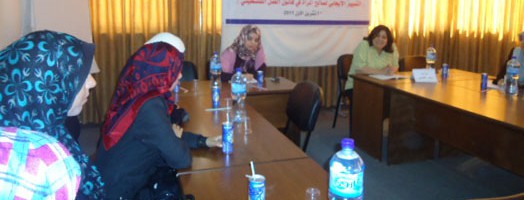Positive Discrimination in Favour of Women under the Palestinian Labour Law
With support from Konrad Adenauer Stiftung, the Institute of Law (IoL) at Birzeit University organised on 19 October 2011 a legal encounter on Positive Discrimination in Favour of Women under the Palestinian Labour Law.
In her opening remarks, Mrs. Lina at Tounisi, Coordinator of IoL Gaza Office, welcomed the audience and speaker Mr. Zainab al Ghuneimi, Director of the Gaza-based Centre for Women’s Legal Research and Consulting. Mrs. At Tounisi also made a briefing note about the Birzeit Legal Encounters programme.
Mrs. Al Ghuneimi highlighted the significance of organising women’s work in line with the provisions of Title Seven under the Palestinian Labour Law. She explained that the majority of labour cases lodged before courts relate to severance pay and compensation for work injuries. These cases are mostly filed by men. In contrast, cases pertaining to working women’s rights are not brought as much before Palestinian courts. Working women should, therefore, be acquainted with their legally enshrined rights.
Mrs. Al Ghuneimi addressed major rights which the Palestinian Labour Law grants to working women, including a paid maternity leave for a period of 10 weeks, suckling mother’s right to a paid hour of breast feeding for a period of one year, and women’s right to request an unpaid leave for a period of one year after delivery to foster their children.
Privileges in favour of women under the Palestinian Labour Law include the prohibition of work overnight except within the limits identified by the Minister of Labour, regulation of women’s work at hospitals, and prevention of women’s work in hazardous and health damaging occupations, including work in mines and stone quarries, with the exception of those defined by the Minister.
The legal encounter brought together 22 male and female lawyers who raised a number of questions, including about the percentage of working women in Palestine. Mrs. Al Ghuneimi replied that the labour force in the Palestinian territory comprised 16% of female workers and 84% of male workers. A female participant stated that working women did not take their rights through the law due to low awareness within the Palestinian society as well as the patriarchal pattern of Arab societies. However, Mrs. Al Ghuneimi commented that this problem was generated by the deteriorated economic situation in the Palestine.
In conclusion, Mrs. Lina at Tounisi extended thanks and gratitude of both the IoL and Birzeit University to Mrs. Al Ghuneimia and the audience for their effective participation and discussion in the legal encounter.











